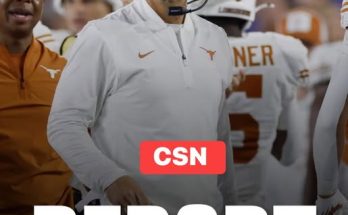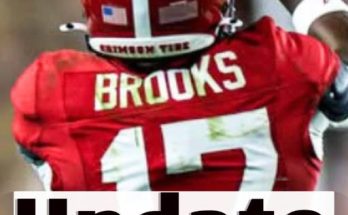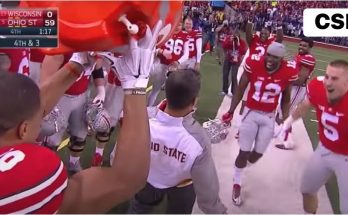Auburn fans could hardly believe what they saw Saturday afternoon. In what was expected to be a competitive SEC matchup, the Tigers found themselves in a tailspin after quarterback Jackson Arnold threw a backbreaking interception that changed the entire complexion of the game. The play—a disastrous 89-yard pick-six—put Arkansas ahead 21-10 and led to head coach Hugh Freeze making one of the toughest calls a coach can make: benching his starting quarterback.
The decision to pull Arnold sent shockwaves through Jordan-Hare Stadium and rippled across the college football world. It wasn’t just about one mistake—it was the culmination of mounting frustration over inconsistency, missed reads, and an offense that has struggled to find its rhythm all season. Auburn came into the matchup with renewed optimism after showing flashes of potential in previous weeks, but that optimism evaporated as Arkansas’ defense capitalized on the Tigers’ errors, forcing turnovers and dictating the tempo from the opening quarter.
Jackson Arnold, a highly touted transfer expected to be the cornerstone of Auburn’s offensive rebuild, entered the season with immense expectations. He was supposed to be the answer to years of instability at the quarterback position. Auburn fans had visions of a dynamic, dual-threat leader capable of revitalizing an attack that has sputtered since the days of Nick Marshall and Cam Newton. Yet, as the season progressed, the Tigers’ passing game continued to lag, and Arnold’s decision-making came under increasing scrutiny.
The interception that sealed his fate on Saturday was as brutal as it was avoidable. Facing pressure on third down deep in Auburn territory, Arnold tried to force a throw into tight coverage—an ill-advised pass that was easily read by Arkansas’ cornerback, who jumped the route and sprinted nearly the entire field for a touchdown. The stadium fell silent, except for the roars of Razorback fans celebrating in disbelief. As Arnold trudged toward the sideline, helmet hanging loosely in his hand, it was clear the coaching staff had reached its limit.
Hugh Freeze’s reaction was immediate and firm. Known for his offensive mind and patient approach with quarterbacks, Freeze walked over to Arnold and had a brief, intense conversation before signaling for the backup to warm up. It was a moment of accountability and necessity. Freeze had defended Arnold in press conferences throughout the season, emphasizing growth, learning curves, and the importance of leadership through adversity. But this time, the tone was different. The Tigers were at risk of losing control of a winnable game, and something had to change.
The backup quarterback—whose name echoed through the stadium as fans cheered for a spark—entered the game to try to steady a team reeling from its own mistakes. His first few series were cautious but efficient, relying on short passes and a steady running game to rebuild confidence. While the Tigers clawed their way back into contention late in the third quarter, the damage from Arnold’s pick-six loomed large. Momentum had swung firmly in Arkansas’ favor, and Auburn’s defense was forced to stay on the field far too long to make up for offensive inefficiency.
The benching raises difficult questions about Auburn’s direction and the future of its quarterback room. Was this merely a temporary move to reset Arnold’s mindset, or has Freeze already begun looking toward a new signal-caller to finish the season? For a team still trying to reestablish its identity in the SEC, consistency under center is vital. The constant shuffling between quarterbacks can stunt development, fracture team chemistry, and undermine confidence. Yet, at the same time, accountability matters—especially in the SEC, where the margin for error is razor thin and every mistake is magnified under the national spotlight.
Arnold’s struggles are not entirely his own doing. Auburn’s offensive line has been inconsistent in pass protection, allowing pressure that has disrupted timing and forced hurried throws. The wide receivers, though talented, have battled drops and miscommunication on routes. The running game, once the hallmark of Auburn football, has lacked its usual dominance, putting even more pressure on the passing game to produce. In many ways, Arnold has been a victim of an offense still trying to find its balance and identity under a relatively new system.
Still, the responsibility that comes with the quarterback position is immense. Every throw is analyzed, every decision scrutinized, and every mistake amplified. Arnold’s interception was the kind of moment that defines a game—and sometimes, a season. Whether he rebounds from this setback or fades into Auburn’s long list of short-lived starters will depend largely on how he responds to adversity. Great quarterbacks often define their careers not by how they perform when things go well, but by how they handle failure and fight their way back.
After the game, Hugh Freeze was measured but direct in his postgame comments. “We’ve got to take care of the football,” he said. “That’s the bottom line. You can’t win in this league giving away points like that. Jackson is a talented young man, and he’s got a bright future, but today we needed a spark, and we had to make a change.” Freeze emphasized that the decision wasn’t personal—it was about giving the team the best chance to compete. But he also acknowledged the emotional toll such moments can have on a player. “Quarterbacking at this level comes with pressure. How you handle that pressure determines what kind of player you become.”
In the locker room, teammates rallied around Arnold, offering encouragement despite the disappointment. Several players were seen patting him on the shoulder, and offensive leaders spoke to the media about unity and resilience. “We win as a team, we lose as a team,” said one Auburn captain. “Jackson’s our brother. We’ve all made mistakes out there. He’ll learn from this, and we’ve got his back.”
That type of camaraderie will be essential in the weeks to come. Auburn’s schedule doesn’t get any easier, and with SEC opponents looming, the Tigers must regroup quickly if they want to salvage the season. Freeze’s challenge now is to manage the locker room dynamics—keeping Arnold engaged and confident while giving the backup an opportunity to prove himself. It’s a delicate balance that can either strengthen a team or divide it, depending on how it’s handled.
For Auburn fans, the frustration is understandable. The program has been yearning for stability at quarterback for years, cycling through recruits, transfers, and short-term starters without finding a lasting solution. Each season brings renewed hope that “this” will be the year the Tigers finally establish a consistent, explosive offense—only for inconsistency and turnovers to derail progress. Arnold’s benching, though dramatic, is emblematic of that ongoing struggle.



